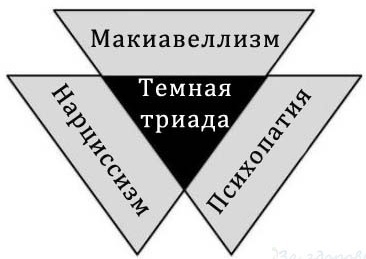Content
- The concept of Machiavellianism in psychology
- Who is Machiavellian?
- Study of the phenomenon
- Signs of Machiavellianism
- Basic techniques of the Machiavellian
- Machiavellianists - who are they for society?
- Machiavellian negativity
- What is the problem with Machiavellian personality?
- Modern Machiavellianism
- Machiavellianism and ethics
- Machiavellianism and the locus of control
- Machiavellianism and the triad of personality traits by G. Eysenck
- Machiavellianism and the Big Five personality traits
- Machiavellianism and the Dark Triad of Personality
- Machiavellianism and intellectual performance
- The mediation of the connections of Machiavellianism
- Video about Machiavellianism
In life, one often has to deal with two-faced people who, by constructing cunning manipulations and intrigues, mislead others and use them. In psychology, this behavior is usually called Machiavellianism.
This is a term that comes from the name of the thinker Niccolo Machiavelli and is partly related to the ideas outlined in his political work "The Sovereign", written by him in the 16th century. Later, Machiavellianism was considered by psychologists outside of politics, as a set of personal characteristics and qualities of an individual who, desiring
achieve your goals, uses dishonest and unethical means.The concept of Machiavellianism in psychology
In his treatise, the Italian philosopher and politician describes the leader of the nation, the "sovereign", as a strong personality, for whom, without a doubt, the welfare and preservation of the country should be unshakable priority. To achieve this goal, it is possible to use any effective measures (according to the principle "the end justifies the means") - forgery, manipulation, lies, violence.
According to the thoughts of the philosopher, set out in his historical work, such a ruler should not be confused by any moral and ethical principles and foundations on which society is oriented.
Later in psychology, such manipulators began to be called Machiavellianists. They are not characterized by the use of brute physical force to achieve their goals, but but they masterfully apply other techniques that affect the consciousness and will of others:
- flattery;
- deception;
- blackmail;
- threats;
- bribe;
- intimidation.
 Such individuals do it for a reason, unlike mentally ill people, but for a specific purpose, for the sake of self-benefit, therefore psychologists do not attribute Machiavellianism to mental illness, but recognize a feature personality. For the sake of achieving their goals, Machiavellians absolutely do not take into account the needs and needs of other members of society, who may often not even realize that they are being manipulated.
Such individuals do it for a reason, unlike mentally ill people, but for a specific purpose, for the sake of self-benefit, therefore psychologists do not attribute Machiavellianism to mental illness, but recognize a feature personality. For the sake of achieving their goals, Machiavellians absolutely do not take into account the needs and needs of other members of society, who may often not even realize that they are being manipulated.
Who is Machiavellian?
Machiavellianism in psychology is a personality trait of a person based on heartlessness, cruelty, indifference to morality and a tendency to manipulate other people. A person who is a Machiavellian did not necessarily study the work of Machiavelli "The Sovereign", with which the origin of this term is connected. Duplicity in general is characteristic of many people in life, but among the Machiavellianists it is still more pronounced.
If in ordinary life they can sometimes lie in order to take time off from work early or skip a lecture, then for Machiavellians, lying is common. Such individuals are by their nature very insidious, calculating and prone to deception, and for them the use of other people for the sake of implementing their plans is not something immoral.
Machiavellianism is more inherent in people:
- cynical;
- cold;
- unprincipled;
- emotionally cold;
- immoral.
Machiavellians believe that interpersonal manipulation is the only key to achieving the heights of life and therefore behave accordingly. Such people are not characterized by benevolence, conscientiousness, the ability to put oneself in the place of another person.
Study of the phenomenon
The first serious study of Machiavellianism took place in 1970. and it was proven given by American psychologists Richard Christie and Florence Gies.
given by American psychologists Richard Christie and Florence Gies.
They developed a special scale of Machiavellianism, which was based on 3 key psychological factors:
| Disregard for social morality | It is always used with ease by a Machiavellian, if moral prohibitions and foundations prevent him from realizing his plans. At the same time, such a person can skillfully manipulate her dogmas to achieve the set goal. |
| Attitude towards people | Machiavellian manipulators have a cynical, suspicious and specific attitude towards other people. is never considered by them as a person experiencing emotions, but only as a subject or instrument for achieving goals. |
| Behavior in society | Machiavellians deliberately use manipulative techniques when building relationships with other people in order to obtain maximum benefits. |
On the basis of these factors, psychologists have compiled a test to assess the level of Machiavellianism in an individual. His results are assessed on a special scale, according to which, the more points a subject gains, the more pronounced the traits of a manipulator are.
In addition to foreign studies in Russian psychology, there were also specialists studying the problems of Machiavellianism. So, at the Department of Social Psychology, Moscow State University named after M. IN. Lomonosov, a translation of the scales diagnosing Machiavellianism was carried out. In addition, Russian researchers came to the conclusion that Machiavellianism is very clearly manifested in certain social groups - among students, among those convicted of financial fraud.
Signs of Machiavellianism
Machiavellianism in the field of psychology is an individual's actions aimed at achieving a set task in any way, including immoral ones.
Among other people, Machiavellians stand out in several important ways:
- do not know how to sympathize and sympathize with other people (low level of empathy);
- their priority is career achievements and connections, and not building friendly relations;
- they are aimed only at satisfying their own ambitions;
- have a high opinion of themselves, consider themselves attractive in appearance, excellent interlocutors and partners;
- are usually very self-confident;
- easily manipulate and exploit other people;
- flattery and sycophancy are often present in speeches;
- calmly lie and deceive, if necessary and can bring certain benefits;
- do not consider it necessary to adhere to any moral principles;
- try not to get attached emotionally to anyone, avoid any obligations;
- can be aloof, ascetic and closed in communication;
- prone to cynicism and cruelty;
- are distinguished by longsuffering and prudence;
- hide their true intentions from others;
- stand out from others with a life grip;
- do not always think about the consequences of their actions.

When communicating with other people, depending on the situation, Machiavellians use flattery, compliments, intimidation, deception, passive aggression. If necessary, they do not hesitate to press on sore spots, to cause a feeling of shame or guilt in the interlocutor.
They know how to keep their word, but they will do it exactly as long as it suits them. Unlike sociopaths and narcissists, they will not threaten their opponent with direct physical violence, although they can be aggressive and harm others with their manipulative actions.
Machiavellians think in very mundane categories and the main values for them in life are material (power, money, real estate, jewelry), and not abstract spiritual ones. Just like daffodils, Machiavellians have charisma, charm, can become the center of events, if it is beneficial to them.
Basic techniques of the Machiavellian
Machiavellianism in psychology is a special manipulative style of human behavior, thanks to which he can achieve from other people the desired actions and deeds and ultimately achieve his goals. Most often, the victims of such manipulators do not even suspect that they are being controlled and used for mercenary purposes.
There are several techniques or techniques that help Machiavellians to influence the will and psyche of people:
- forgery - misleading the victim by presenting non-existent realities as valid and real;
-
flattery - uttering supportive, ingratiating speeches (compliments, approval) that help to get what you want from the victim;

- outright deception - concealing the true intent and providing the victim with other, invented information;
- bribe - the technique of “coaxing” the victim by transferring money to her, providing services in order to further benefit.
Machiavellianists - who are they for society?
For society, Machiavellians can in some cases pose a threat, since people often suffer because of their cunning combinations.
Although they do not use violence and physical force directly, they are characterized by the use of immoral techniques:
- blackmail;
- threats;
- incitement to conflicts.
In this regard, as a result of the actions and deeds of Machiavellians (especially those in power) often arise difficult, sometimes tragic situations, since, in realizing their plans in life, they never reckon with feelings and reactions others.
Despite some alienation, Machiavellians feel better in society, since it is in such an environment that they can maximize their qualities. Their cynical attitude towards life allows them to act very carefully and patiently, to control their impulses.
To achieve their goals, they use a whole arsenal of skillful techniques that they use depending on the situation and their intentions. They can be charming and friendly, or they can act tough, manipulate and pressure other people.
Machiavellian negativity
Machiavellians, as well as sociopaths and narcissists, are referred to as negative personality types in psychology. All these types are characterized by the most striking predominance of the dark sides of human nature. In life and in psychology, sociopaths and narcissists tend to be more alert than the manipulative Machiavellian.
All these 3 types are characterized by such common negative traits as devaluation and neglect of the people around them. At the same time, we can say that Machiavellians are less dangerous to society in the literal sense than, for example, sociopaths, who can use brute force and behave inappropriately.
Machiavellianism can often be weakly expressed and not carry a real threat to the life and mental state of people.
Cases when a Machiavellian must be isolated from society are not so common and are associated not with direct physical impact, but with the commission of:
- office forgeries;
- economic crimes;
- financial fraud.
 For the most part, the negative traits of Machiavellians that help them achieve their goals prevent them from having real ones at the same time. friends and build friendly relationships with people and thus prevent them from living a full and happy life.
For the most part, the negative traits of Machiavellians that help them achieve their goals prevent them from having real ones at the same time. friends and build friendly relationships with people and thus prevent them from living a full and happy life.
What is the problem with Machiavellian personality?
Machiavellianism in psychology is a special personality syndrome that presupposes such a combination of cognitive, behavioral and motivational characteristics of the individual that help him to control and manipulate people. Most psychologists say the main problem of the Machiavellianists is that they absolutely do not think what they are doing. something bad when people are used and behave immorally towards them for the sake of realizing their ideas and ideas.
Machiavellianists are well-rounded people with an analytical mindset. They have unique insight and are able to see the true intentions of people, calculate their moves and actions in advance. Thanks to these qualities, they are able to skillfully manipulate others. However, such insight hides the psychological problems of the Machiavellianists - distrust of people, cynical attitude caused by neglect and disbelief in good intentions.
In public, such personalities can be confident, open and cheerful, but in fact they do not care at all about the motives and emotions of other individuals. For this reason, it is difficult for them to build true, unselfish connections in all areas of life - work, love, friendship. In this regard, some specialists in the field of psychology call Machiavellianism in another way the syndrome of emotional coldness.
Modern Machiavellianism
In the modern world, Machiavellianism manifests itself in people inclined to manipulate the consciousness of other individuals in politics and careers. So many public and political figures do not hesitate to use his techniques (deception, flattery, threats) to achieve their selfish goals and propagate their ideas using the media.
Today, with the development and appearance of the Internet, it has become much easier to manage and influence people, but at the same time, competition, since people, if desired, can receive information from different sources and find out different opinions on one or another question. This forces modern Machiavellianists to act more skillfully and sophisticated.
These days, various trainings and seminars on personal and career growth are offered to learn unscrupulousness in achieving their goals. In such classes, zealous careerists are advised not to pay attention to the needs and feelings of others if they interfere with promotion, and to use their weaknesses to achieve goals.
Machiavellianism and ethics
As described above, for Machiavellians, ethical standards have little value in life, so they can easily neglect them when necessary. This is typical for both women and men who have manifestations of Machiavellianism.
However, at the same time, men demonstrate, on average, an overall higher level of Machiavellianism than women, since by their nature they are more aggressive and tend to take a dominant position by any by. At the same time, women reveal themselves more in certain positions, which they manage to perform better and more inventively - to deceive, to make a pleasant impression, to press on pity.
Machiavellianism and the locus of control
In psychology, the locus of control is understood as the personality's property to attribute its successes and failures to external or internal factors. So, a person with an internal locus of control will look for the cause of failure in himself, and with an external one - in extraneous factors.
Machiavellians are characterized by an external (external) locus of control. Research conducted in the 70-80s. showed that internal (internal) control and its tactics (perseverance, hard work) are not of interest to Machiavellians, since they do not lead to the rapid achievement of goals.
For this reason, they, seeing and calculating how external circumstances will influence their affairs, and try to influence them in any way that can help them quickly achieve their goal. The norms of morality go far, as the Machiavellianists believe that lies and betrayal can be very useful if they help to succeed.
Machiavellianism and the triad of personality traits by G. Eysenck
The triad of personal properties of the German-British scientist and psychologist G. Eysenck includes:
- neuroticism - associated with anxiety, instability;
- extraversion - focus on the outside world and other people, and not on yourself;
- psychoticism - predisposition to psychosis.
In order to find out whether these traits are characteristic of the Machiavellianists, tests were carried out among students studying for management (future businessmen). This target group was not chosen by chance, since at the philistine level people tend to believe that Machiavellianism to a greater extent inherent in people who are purposeful, active, connected in some way with doing business and management.
Among all the students were selected those whose level of Machiavellianism turned out to be really high, and further the analysis carried out with them showed that Machiavellianism in them is often correlated with extraversion and psychoticism, but not with neuroticism.
However, later studies conducted with other individuals showed that this pattern is not observed in all cases, which indicates the inconsistency of the results obtained.
Machiavellianism and the Big Five personality traits
The big five personality traits is a model of a person's personality, reflects perception people to each other and includes 5 independent traits or dispositions:
- extraversion;
- conscientiousness;
- neuroticism;
- benevolence;
- openness to experience.

The works of psychologists reflect that Machiavellianism is inversely related to benevolence and conscientiousness - the higher its level, the less these qualities are manifested. According to the positions of neuroticism and openness to experience, depending on the moderation of the severity of manipulative inclinations, the data differ and cannot be considered reliable.
Extroversion or social orientation is to a large extent characteristic of Machiavellianists, even though many of them are inherently alienated. This is due to the fact that people for them are a means and a tool to accomplish their tasks and achieve cherished goals, so they cannot not communicate and avoid them.
Machiavellianism and the Dark Triad of Personality
In psychology, there is such a thing as the dark triad, which includes three antisocial traits - psychopathy, narcissism and Machiavellianism. This group of personal characteristics received this name because of the prevailing evil qualities.
It is believed that people with high rates of these traits are more likely than others to commit various crimes and provoke social upheaval if they are in leadership positions. All individuals with any of these deviations lack empathy and are less likely to believe that people can be sincere and benevolent.
Among all three personality traits, Machiavellianism stands out the most, since its distinctive the trait is the desire to profit, while psychopaths and narcissists do it less well and prudently.
Machiavellianism and intellectual performance
Machiavellianism in psychology is a method of influencing people when a person manages to achieve what he wants with the help of tricks and manipulations. It is generally accepted in society that such manipulators have outstanding intellectual abilities, since they often hold high positions, have a good financial position and can effectively influence others in order to achieve their own goals.
However, the data obtained in the course of various studies provide conflicting results and show that Machiavellian do not always have high intellectual abilities, but, at the same time, they are most often not below average level.
The mediation of the connections of Machiavellianism
Machiavellianism is strongly associated with:
- locus of control;
- moral and ethical ideas;
- general personality traits (consciousness, benevolence);
- a large number of private personal properties (beliefs, ambitions, education).
Some dispositions of Machiavellianism seem paradoxical. For example, it is not entirely clear how these people can combine the desire for power and a dislike for work, low motivation for achievement, and the absence of an internal locus of control. The available research does not fully answer these questions.
Currently, Machiavellianism continues to develop and be studied by psychologists, political scientists and philosophers. As this social phenomenon develops, it is possible that new theories and assessments of the psychological portrait of the Machiavellianists will appear, allowing a better understanding of their motives, goals and strategies.
Video about Machiavellianism
Machiavellianism in psychology:



